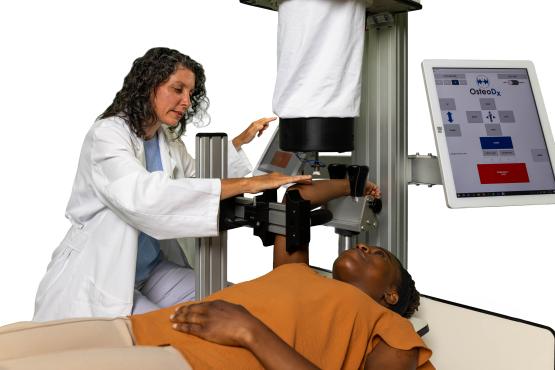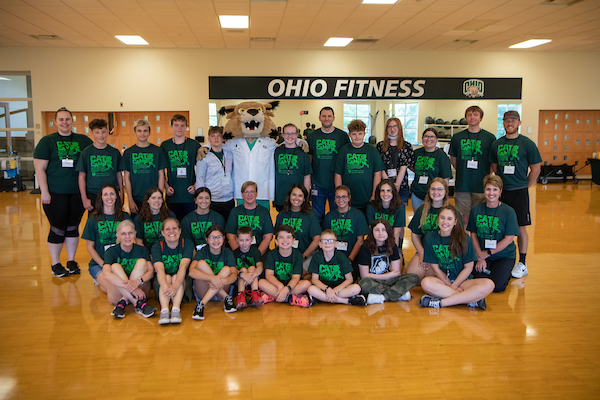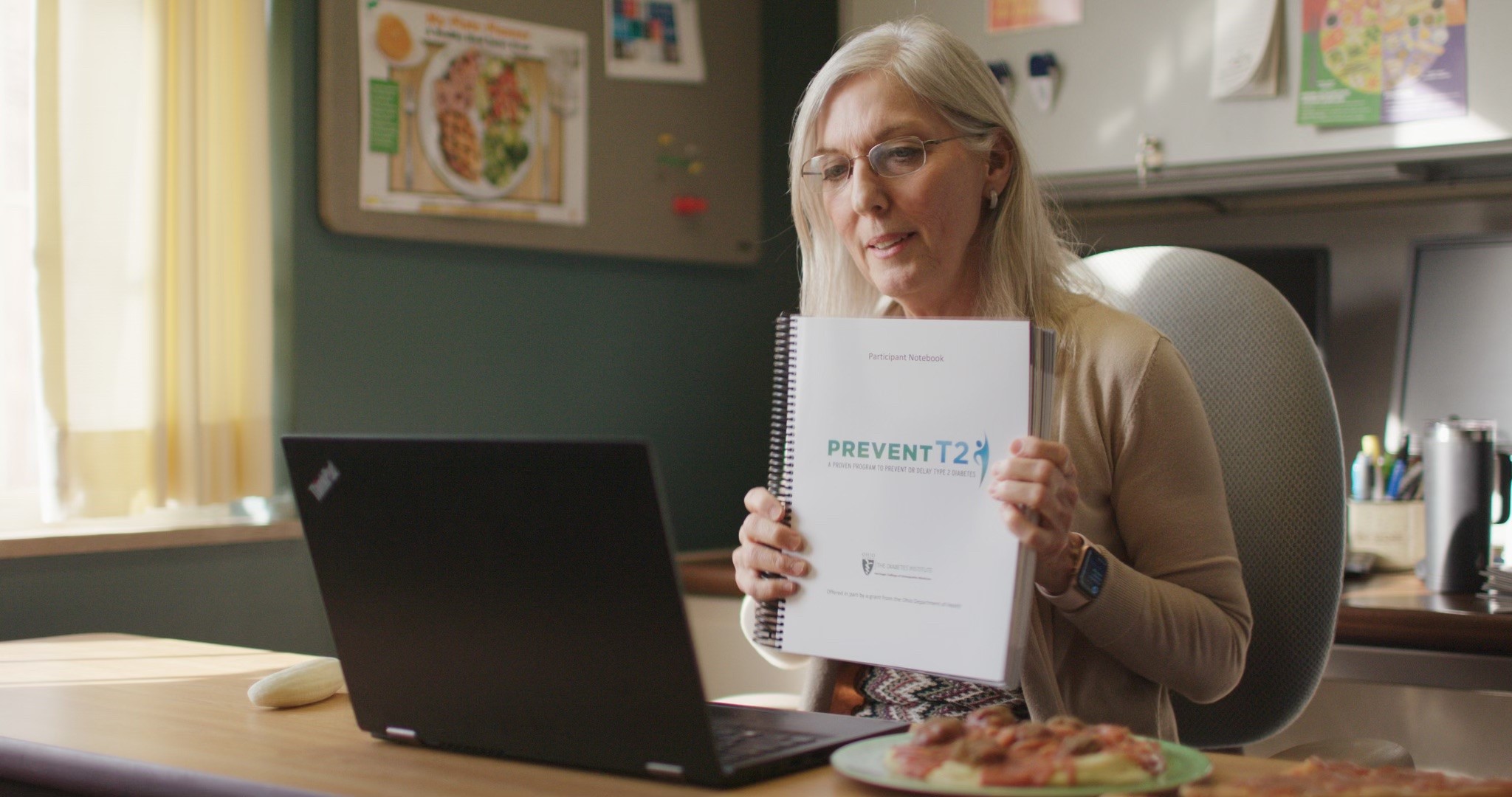
Diabetes, a national crisis, hits close to home in the heart of Appalachia. While the infamous "Diabetes Belt" traditionally encompasses southern states like Georgia and Alabama, the Appalachian region grapples with similarly alarming rates of diabetes-related mortality.
A recent study by the CDC underscores the gravity of the situation, revealing that diabetes rates in Appalachia surpass the national average. Within Ohio, Southeast Ohio bears the brunt, with mortality rates soaring well above the state and national average.
In a region where community means everything, Ohio University has taken this challenge head-on, working to change outcomes and provide critical treatment options in these high-risk areas.
According to the recent report, “Diabetes Mortality Statistics: United States and Ohio,” prepared by OHIO Alliance for Population Health members Shelby Level, Elizabeth Beverly and Rick Hodges, from 2018-2022 Southeast Ohio had the highest diabetes mortality rate in the state with 55.5 deaths per 100,000 population, 82% higher than the state average. In 2018-2022, Vinton County, a contiguous county to Athens County, had the highest diabetes death rate in Ohio and ranked 2,743rd (out of 2,824) in diabetes mortality among all United States counties with a rate of 88.3 deaths per 100,000 population.
Beverly, a professor and co-director of OHIO’s Diabetes Institute, has been working to support those with diabetes and find ways to mitigate this disease for years, shedding light on how social drivers play a big part in this region.
Elizabeth Beverly works with kids at the Diabetes Institute's kids camp that offers children with Type 1 diabetes an opportunity to connect with other kids throughout the region with the same challenges.
Historically, Appalachian communities face a myriad of obstacles, from economic hardships to limited healthcare access, amplifying the prevalence of diabetes," Beverly explained. “Social determinants like high unemployment rates and low incomes exacerbate health disparities, making it more difficult for residents to prioritize their well-being.
In this landscape, access to care emerges as a critical issue. Underserved areas struggle with a lack of diabetes specialists and physicians, leaving many without proper management and at risk of complications. The burden is especially heavy in rural areas, where transportation to health appointments and pharmacies presents additional hurdles.
Acknowledging the importance of access, Ohio University’s Diabetes Institute has stepped in to provide innovative programs and strategic partnerships to help level the playing field for people across the region. The Diabetes Institute operates on multiple fronts, offering educational initiatives and crucial support systems for both adults and children grappling with diabetes.
One such initiative is the Diabetes Nurse Navigator program, which works with adults and children with diabetes to help them overcome barriers to care and help make sure they have resources they need to manage their diabetes, including addressing social drivers of health like transportation, helping individuals navigate insurance, or facilitating access to medication.
Additionally, the Institute's yearlong diabetes prevention program empowers at-risk individuals to make lifestyle changes that reduce their chances of developing Type 2 diabetes.
“We offer direct services that create a supportive community for those with diabetes and prediabetes where they can get education and the resources they need at little to no cost,” said Karie Cook, director of operations at the Diabetes Institute. “Our diabetes education program for those with diabetes equips participants with the knowledge, skills and confidence to better control their diabetes and reduce the risk of complications.”
The Diabetes Institute also offers a children’s camp in the summer for children with Type 1 diabetes to connect them with other kids throughout the region with the same challenges they have so they can develop friendships and know they’re not alone in managing this disease. The camp helps campers build self-esteem, confidence and independence in their diabetes management.

Members of the Diabetes Institute, students and kids participating in the kids camp pose with Rufus.
During the pandemic, the Diabetes Institute even began offering its diabetes education and prevention programs virtually so residents could still access programs.
“We saw continued engagement and success with those programs, so we have continued to offer programs virtually, in-person or a combination of both,” Cook said. “This has improved the accessibility of our programs for participants without having to worry about barriers such as transportation or childcare.”

Diabetes Educator Karen Bailey provides diabetes prevention training virtually.
Ohio University's commitment extends beyond clinical interventions. The Institute also trains the next generation of scientists through initiatives like the R25 Diabetes Institute Summer Interprofessional Research Experience (DISIRE). In June 2023, the Heritage College of Osteopathic Medicine launched the first year of the five-year program which seeks to increase the number of underrepresented minority and Appalachian undergraduates who enter graduate programs in the biological sciences, health sciences or related fields.
“There is a lot of training happening at OHIO both to ensure medical students are cognizant of how to serve rural areas, but also to make sure health professionals in the region are up to date,” Beverly added. “One way we do this is by providing continuing medical education for providers in the region on various topics associated with diabetes.”
By equipping students with the tools to address diabetes in rural settings, the University is cultivating a sustainable pipeline of specialists dedicated to serving underserved communities.
“In Southeast Ohio, there are fewer diabetes specialists than in other regions of the state and patients often face barriers that make it more difficult for them to travel distances to seek care,” Cook said. “The free diabetes clinic offered by the Heritage Community Clinic, as well as Rising Suns Pharmacy are fantastic resources in this area, but more resources like this are needed throughout Southeast Ohio to help ensure residents have access to appropriate care.”
Albany, Ohio, native, pharmacist and associate clinical professor Sarah Adkins epitomizes this dedication to community service. Recognizing the dire need for affordable medications in Southeast Ohio, she spearheaded the establishment of a charitable pharmacy, the Rising Suns Pharmacy, which ensures that no one has to choose between their health and financial stability.
“My goal with this pharmacy is to make an impact and fix some of the barriers by making medicine available to everyone,” Adkins said. “Copays for insulin can get up to $1,500, which can equate to someone’s rent for one month. There are incredible free resources for education and clinics thanks to Ohio University—why should medication be any different?”
Not only can people pick up medications for free at the pharmacy, but Adkins explains that thanks to the generosity of volunteer Dan Hughes, they are able to deliver medications to people in the region at home for free.
The impact of these efforts reverberates throughout the region, offering a lifeline to those grappling with the burden of diabetes. By bridging gaps in access, education and affordability, Ohio University is not only revolutionizing diabetes care but also nurturing a healthier future.
“We will continue to offer high-quality diabetes prevention and education programs at little to no cost to help ensure residents are able to access these programs. We also want to be innovative and responsive to the needs of community members by seeking feedback from those impacted by diabetes through our Patient and Family Advisory Committee. Tapping into the unique perspectives of patients and their families can help us shape the future of regional health care services, ensuring they are truly patient-centered,” Cook added.
Currently, investigator members of the Diabetes Institute are conducting research in cardiovascular disease, diabetes, insulin resistance, obesity and population health that will impact the future of diabetes patient care, prevention and cure.
Karie Cook (left) gives Diabetes Educator Karen Bailey (right) an award for her service during the Diabetes Institute's anniversary.
The OHIO Alliance for Population Health (OAPH) is a statewide collaborative focused on improving the health of all Ohioans by solving the most complex and pressing population health concerns across the state. In line with OAPH’s overarching mission, this report aims to identify disparities in diabetes mortality among Ohioans and consider how these disparities can be addressed to improve health and well-being across the state.
The Diabetes Institute serves students and professionals by providing education and training in the field of diabetes. This includes continuing education for health care professionals as well as research seminars and symposia focused on sharing research findings and cultivating research collaborations. Recently, Beverly was also asked to serve on the American Diabetes Association’s (ADA) Professional Practice Committee (PPC) to establish the national Standards of Care in Diabetes.


